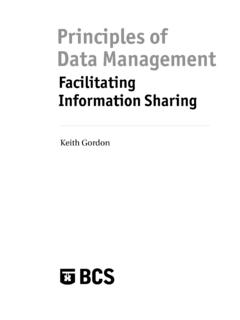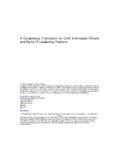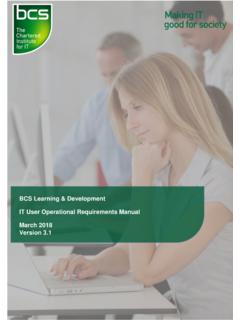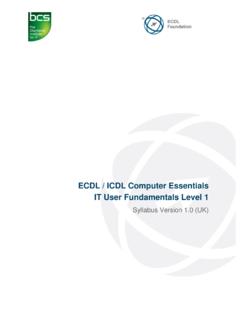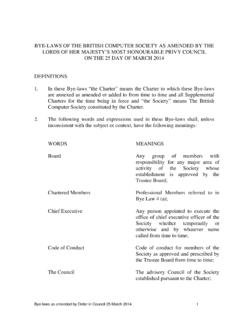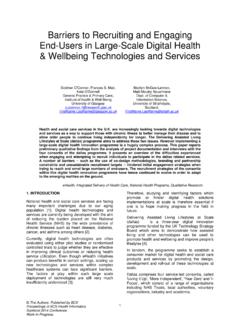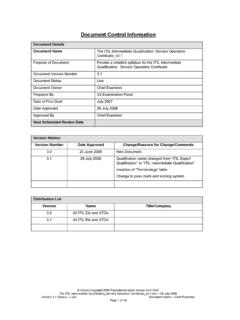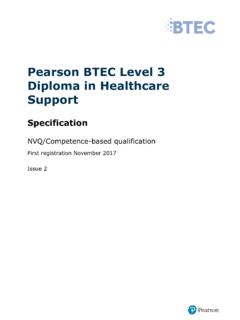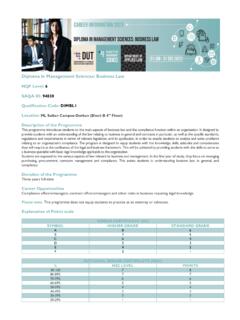Transcription of BCS Level 4 Diploma in Data Analysis Concepts QAN …
1 Copyright BCS 2020 Page 1 of 19 BCS Level 4 Diploma in Data Analysis Concepts Version 4 July 2020 BCS Level 4 Diploma in Data Analysis Concepts QAN 603/0823/0 Version 4 July 2020 Copyright BCS 2020 Page 2 of 19 BCS Level 4 Diploma in Data Analysis Concepts Version 4 July 2020 This is a United Kingdom government regulated qualification which is administered and approved by one or more of the following: Ofqual, Qualification in Wales, CCEA Regulation or SQA Copyright BCS 2020 Page 3 of 19 BCS Level 4 Diploma in Data Analysis Concepts Version 4 July 2020 BCS Level 4 Diploma in Data Analysis Concepts Contents Introduction .. 5 Objectives .. 5 Course Format and Duration .. 5 Eligibility for the Examination .. 6 Format and Duration of the Examination .. 6 Additional time for learners requiring Reasonable Adjustments due to a disability .. 6 Additional time for learners whose language is not the language of the examination .. 6 Guidelines for Training Syllabus.
2 8 Levels of Knowledge / SFIA Levels .. 16 Question Weighting .. 16 Format of Examination .. 17 Trainer Criteria .. 17 Classroom Size .. 17 Recommended Reading List .. 18 Useful Websites .. 19 Copyright BCS 2020 Page 4 of 19 BCS Level 4 Diploma in Data Analysis Concepts Version 4 July 2020 Change History Any changes made to the syllabus shall be clearly documented with a change history log. This shall include the latest version number, date of the amendment and changes made. The purpose is to identify quickly what changes have been made. Version Number Changes Made Version December 2016 Syllabus Created Version December 2016 Compliance statement added to title. Version July 2017 Amendments following review Version June 2020 Update to DPA references in LO s and Version 4 July 2020 Document amended to make it suitable for a range of different learners as well as apprentices Copyright BCS 2020 Page 5 of 19 BCS Level 4 Diploma in Data Analysis Concepts Version 4 July 2020 Introduction This Diploma is the second module of the two knowledge modules required for the Level 4 Data Analyst apprenticeship programme.
3 It covers the range of Concepts , approaches and techniques that are applicable to Data Analysts, for which learners are required to demonstrate their knowledge and understanding. This Diploma can also be delivered as a standalone programme for learners working to develop their knowledge and understanding of the approaches and solutions used for data Analysis . Objectives Learners should be able to demonstrate knowledge and understanding of Data Analysis and its underlying architecture, principles, and techniques. Key areas are: 1. Explore the different types of data, including open and public data, administrative data, and research data 2. Understand the data lifecycle 3. Illustrate the differences between structured and unstructured data 4. Understand the importance of clearly defining customer requirements for data Analysis 5. Understand the quality issues that can arise with data and how to avoid and/or resolve these 6. Explore the steps involved in carrying out routine data Analysis tasks 7.
4 Understand the range of data protection and legal issues 8. Explore the fundamentals of data structures 9. Explore the database system design, implementation, and maintenance 10. Understands the organisation's data architecture 11. Understands the importance of the domain context for data analytics Learners who are completing this as part of the apprenticeship programme should collate evidence of lessons learnt in these key areas and these should be reflected upon when the learner is compiling the Summative Portfolio. This will provide the learner with the opportunity to identify how the task might be done better/differently with knowledge subsequently gained. Target Audience The Diploma is relevant to learners who are either enrolled on a Level 4 Data Analyst apprenticeship programme or want to gain more understanding of big data analytics to a Level 4 standard. Course Format and Duration Candidates can study for this Diploma by attending a training course provided by a BCS accredited Training Provider.
5 The estimated total qualification time for this Diploma is 600 hours. Copyright BCS 2020 Page 6 of 19 BCS Level 4 Diploma in Data Analysis Concepts Version 4 July 2020 Eligibility for the Examination Apprenticeship learners: Individual employers will set the selection criteria, but this is likely to include 5 GCSEs (especially English, mathematics and a science or technology subject); other relevant qualifications and experience; or an aptitude test with a focus on IT skills. Level 2 English and Maths will need to be achieved, if not already, prior to taking the endpoint assessment. Other learners: It is recommended that learners have completed 5 GCSEs (especially English, mathematics and a science or technology subject); other relevant qualifications and experience; or an aptitude test with a focus on IT skills. Format and Duration of the Examination The format for the examination is a one-hour multiple-choice examination consisting of 40 questions. The examination is closed book (no materials can be taken into the examination room).
6 The pass mark is 26/40 (65%). Additional Time for Learners Requiring Reasonable Adjustments Due to a Disability Learners may request additional time if they require reasonable adjustments. Please refer to the reasonable adjustments policy for detailed information on how and when to apply. Additional Time for Learners Whose Language is Not the Language of the Examination If the examination is taken in a language that is not the learners native/official language, then they are entitled to 25% extra time. If the examination is taken in a language that is not the learners native/official language, then they are entitled to use their own paper language dictionary (whose purpose is translation between the examination language and another national language) during the examination. Electronic versions of dictionaries will not be allowed into the examination room. Guidelines for Training Providers Each major subject heading in this syllabus is assigned an allocated time. The purpose of this is two-fold: first, to give both guidance on the relative proportion of time to be allocated to each section of an accredited course and an approximate minimum time for the teaching of each section; second, to guide the proportion of questions in the exam.
7 Training Providers may spend more time than is indicated and learners may spend more time again in reading and research. Courses do not have to follow the same order as the syllabus. Courses may be run as a single module or broken down into two or three smaller modules. Copyright BCS 2020 Page 7 of 19 BCS Level 4 Diploma in Data Analysis Concepts Version 4 July 2020 This syllabus is structured into sections relating to major subject headings and numbered with a single digit section number. Each section is allocated a minimum contact time for presentation. Learners enrolled on an apprenticeship programme should be encouraged to consider their Summative Portfolio throughout the modules. Copyright BCS 2020 Page 8 of 19 BCS Level 4 Diploma in Data Analysis Concepts Version 4 July 2020 Syllabus For each top- Level area of the syllabus a percentage and K Level is identified. The percentage is the exam coverage of that area, and the K Level identifies the maximum Level of knowledge that may be examined for that area.
8 1. Types of Data (10%, K2) In this topic, the learner will explore the different types of data, including open and public data, administrative data, and research data. The successful learner should be able to: Describe the differences between data (raw or unorganised facts), information (processed data to make it useful) and knowledge (understanding of information). Typical formats and sources are: CSV, XML, RTF, TXT and File. Benefits and limitations. Database transformations needed of each type are organisation, structuring and processing (or Concept, mapping, matching). Understand and explain the range of different types of data and the implications for allowable use, data quality, privacy concerns and availability. Open and public vs. proprietary data. Operational (data used in the day-to-day business operations) vs. administrative data (data used for the administration and management). Research data. Understand the importance of data classification and describe how to classify data which are: Structured and unstructured data.
9 Quantitative data. o Categorical (Discrete) o Continuous (Time-series) Qualitative data. o Binomial o Nominal o Ordinal Copyright BCS 2020 Page 9 of 19 BCS Level 4 Diploma in Data Analysis Concepts Version 4 July 2020 2. The Data Lifecycle (5%, K2) In this topic area, the learner will explore the data lifecycle. The successful candidate should be able to: Understand and describe how the flow of an information system s data and associated metadata follows a lifecycle. Explain each of the stages of a data lifecycle, which are: Creation; Initial storage; Archived; Obsolete; Deleted. 3. Structured and Unstructured Data (10%, K2) In this topic area, the learner will explain the differences between structured and unstructured data. The successful candidate should be able to: Describe that structured data is information which can be ordered and processed by data Analysis tools. Recognise common sources of structured data: Data files organised sequentially or organised serially.
10 Tables stored within a database management system. Extensible Markup Language. Explain that unstructured data can take various formats: Word processor, spreadsheet and PowerPoint files; Audio; Video; Sensor and log data; External data (such as social media feeds); Paper-based documents. Recognise how structured and unstructured data could complement each other to derive rich insight. Enhance Analysis of the other (Structured or Unstructured text data). Combined into a common model. Big data analytics. Understand the importance of being able to rapidly analyse structured and unstructured data to maximise insight for the business. Copyright BCS 2020 Page 10 of 19 BCS Level 4 Diploma in Data Analysis Concepts Version 4 July 2020 4. Requirements for Data Analysis (15%, K2) In this topic area, the learner will show the importance of clearly defining customer requirements for data. The successful candidate should be able to: Recognise and understand why data does not provide the answers to business problems.
